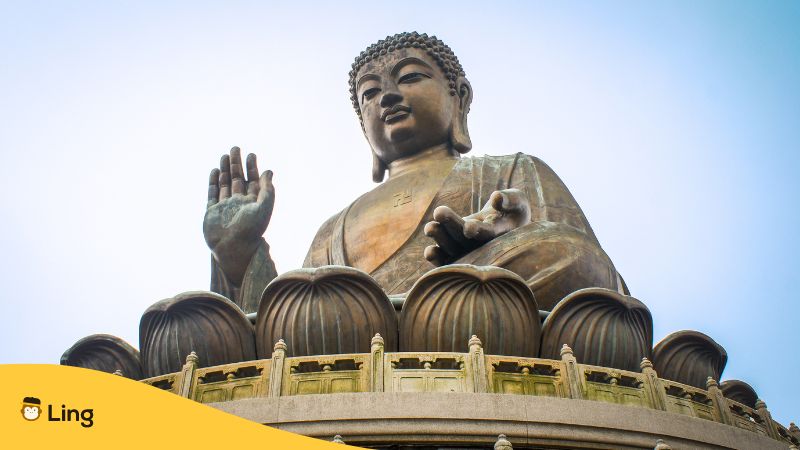China is home to one of the oldest cultures in the world, with a history that spans thousands of years. It’s also a country where religion plays an important role in people’s lives. Moreover, religion in China has a long and complex history shaped by many factors, including politics and culture.
Here are ten interesting facts about religion in China and vocabulary you should know if you want to learn Chinese:
Chinese Culture Is Heavily Influenced By Religion
China is a country rich in history and culture, with a complex religious landscape that has played a significant role in shaping its society. From the early days of Confucianism, Taoism, and Buddhism to the more recent rise of Christianity, religion has been a fundamental part of Chinese culture. In addition to these religions, traditional Chinese beliefs have remained popular for centuries, including ancestor worship.
Despite Crackdowns, Chinese People’s Faith Endures
Many Chinese people are still deeply religious and continue to practice their faith despite some government restrictions. The government is officially atheist, and its policies have made it difficult for some religious groups to practice their faith openly. However, many Chinese people continue to believe in traditional religions like Buddhism or Taoism. Others have converted to Christianity or Islam.

Lighting Incense Is A Common Practice In Chinese Folk Religion
Lighting incense is one of the common religious practices in Chinese folk religion, steeped in tradition and symbolism. For centuries, people in China have been lighting incense in temples, shrines, and at home to honor their ancestors and deities and to seek blessings. The practice of lighting incense is an integral part of Chinese culture and has become a symbol of spiritual devotion and respect.
In folk religions, incense is believed to have a physical and spiritual purifying effect. When burned, the smoke from the incense is believed to carry the wishes and prayers of the people up to the heavens, where the gods and ancestors can hear them. It is also thought that the fragrance of incense attracts the spirits of the gods and ancestors, creating a bridge between the spiritual and physical worlds.
Confucianism Has Been A Huge Part Of Chinese Life For Almost 2,500 Years
Confucianism was propagated by Confucius in the 6th-5th century BCE and has been followed by the Chinese people ever since. It is a way of life that has been transformed over time but still serves as a substance of learning, a source of values, and the social code of the Chinese. It is often characterized as a system of social and ethical philosophy rather than a religion. It has established the social values, institutions, and transcendent ideals of traditional Chinese society. Confucianism has been a major influence in Chinese culture, endorsing humanism and providing a complex system of ethical, societal, party-political, and spiritual teachings.

What Is China’s Main Religion?
China’s main religion is Buddhism. It has been an integral part of Chinese culture and tradition for centuries. China has the world’s largest Buddhist population, with an estimated 185–250 million practitioners. Buddhism was first brought to China around 500 AD and has since spanned through Central Asia along the Silk Road.
Buddhism in China has undergone many changes throughout the country’s history and is varied in its social and religious affairs and philosophical beliefs. Buddhists in China have faced both support and persecution under various leaders, but the religion has remained strong.
Christianity Has A Place In China As Well
Christianity has been present in China for centuries and has seen a significant increase in religious believers over the past. Today, Christianity is still a minority religion in China, but its influence is growing. This growth is attributed to the increasing number of churches, seminaries, and Bible schools in China and the increasing number of Chinese Christians actively involved in evangelism.

Freedom Of Belief Is A Government Policy In China
Religion in China has been a part of the country’s culture for thousands of years, and the government has taken steps to protect citizens’ right to freedom of religious belief. The Constitution of the People’s Republic of China states that citizens can choose and practice a religion. It also says that citizens are free not to believe in any religion or faith. Moreover, the government does not interfere with normal religious activities unless they threaten public order, social stability, or national security.
Islam Also Has A History In China That Extends Back To The 7th Century
Islam is one of the five major religions in China, and it has a long history from the 7th century CE. The spread of Islam in China was slow and gradual, and it was not until the Yuan Dynasty (1271–1368) that it began to gain more traction. During this period, many Muslim communities were established in major cities such as Beijing, Xi’an, and Hangzhou. By the end of the 14th century, Islam had become one of the dominant religions in northwest China.
The Chinese Government Only Recognized Five Religions
It is interesting to note that the Chinese government only recognizes five religions: Buddhism, Catholicism, Daoism, Islam, and Protestantism. These five religions have been officially sanctioned by the Chinese government and are allowed to register with the government and hold worship services.
However, there are also many other popular religious organizations and beliefs that are not officially recognized by the government but still have a strong presence in everyday life. For example, many Chinese will visit temples or shrines dedicated to gods or goddesses throughout the year to pray for good luck or fortune.

Chinese Folk Religions Tend To Be Based On Animism And Ancestor Worship
In traditional Chinese families, ancestor worship was considered an important part of life. Families would keep ancestral tablets in their homes and honor their deceased relatives by offering food, incense, and other items. This practice was believed to help the deceased’s soul to rest in peace and to bring good luck and fortune to the living.
Folk religions also incorporate animism, which is the belief that all living things have a spirit or soul. This religious belief is often seen in the worship of natural objects such as trees and thunder and in the worship of heroic personalities. Animism is also seen in the belief in an afterlife, which is a common theme in these religions.
Chinese Words Related To Religion
The Chinese language has many words related to religion. The following are some of the most commonly used words in this category:
Understanding Religion In China
Religion in China is a complex and fascinating topic that is deeply rooted in the country’s rich history and culture. From the five officially recognized religions to the many folk religions still practiced today, religion plays a significant role in millions of Chinese people’s lives. Whether it’s through the practice of ancestor worship, the belief in an afterlife, or the honoring of natural objects, Chinese religion is a unique blend of philosophy, spirituality, and tradition that continues to evolve and adapt over time.
As China continues to modernize and change, it will be interesting to see how religion in the country continues to evolve and shape the lives of its people. If you want to learn more about China and the Chinese language, check out the Ling app!
Learn Chinese With Ling
The Ling app is the ultimate language learning app that makes learning a new language fun, easy and effective. With the Ling app, you can learn over 60 languages, not just Chinese, at your own pace, anytime and anywhere.
The app is perfect for anyone who wants to learn a new language, whether it’s for travel, work, or personal growth. It offers a wide range of features to help you learn, including interactive lessons, vocabulary lists, and grammar tips. So what are you waiting for? With Ling, the world is at your fingertips!
Download the Ling app for iOS and Android today and start your language-learning journey.



































































